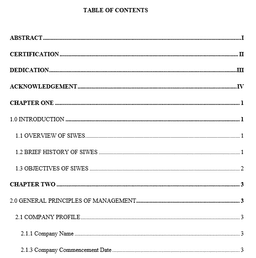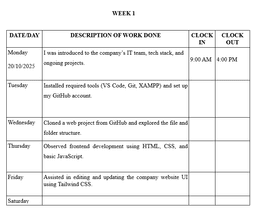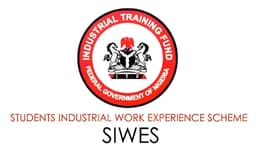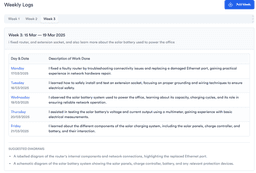The History of SIWES in Nigeria: Purpose, Objectives, and Impact on Students
Discover the full history of the Students Industrial Work Experience Scheme (SIWES) in Nigeria — from its creation in 1973 by the Industrial Training Fund (ITF) to its lasting impact on student training, employability, and industry collaboration. Learn why SIWES was introduced, who it covers, and its key objectives.

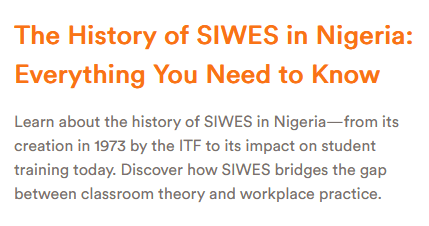
The Students Industrial Work Experience Scheme (SIWES) is one of the most significant initiatives in Nigeria’s educational system. It was established to bridge the persistent gap between classroom theories and the practical skills required by industries.
Created in 1973 by the Industrial Training Fund (ITF), SIWES was designed as a response to complaints from employers that graduates of tertiary institutions lacked adequate technical and practical exposure for employment.
Before SIWES, most Nigerian universities, polytechnics, and colleges of education emphasized theory over practice, producing graduates who often struggled to adapt to real workplace demands.
⚡ SIWES Tools for Students 🔥
Use our free AI-powered tools to make SIWES easier.
SIWES Report Generator — Generate a formatted SIWES report instantly.
https://report.monoed.africa
SIWES Logbook Generator — Create weekly logbook entries in seconds.
https://logbook.monoed.africa
SIWES / IT Placement Finder — Find verified SIWES & IT placement opportunities.
https://siwesfinder.monoed.africa
📙 Final Year Project Tools 🔥
FYP Report Generator — Generate full project chapters and citations.
https://fyp.monoed.africa
Project Topic Generator — Get supervisor-ready project topics instantly.
https://topics.monoed.africa
Why SIWES Was Introduced
In the early 1970s, Nigerian industries were growing rapidly, especially in areas like oil and gas, manufacturing, and construction. However, employers noticed that many young graduates lacked the necessary hands-on experience to operate industrial machinery or perform job-related tasks effectively.
To solve this, the Federal Government, through the Industrial Training Fund (ITF), launched SIWES to:
- Equip students with practical and industrial experience relevant to their fields.
- Strengthen collaboration between educational institutions and industries.
- Enhance graduates’ employability and readiness for Nigeria’s evolving job market.
Timeline of SIWES Development in Nigeria
| Year | Event / Milestone |
|---|---|
| 1973 | SIWES was initiated by the ITF (established under Decree No. 47 of 1971) as a pilot program. |
| 1974 | The Federal Government officially approved and launched the program nationwide. |
| 1978 | The ITF withdrew temporarily from administering the scheme due to financial constraints. |
| 1979 | Management was transferred to the National Universities Commission (NUC) and the National Board for Technical Education (NBTE). |
| 1984 | After a national review, the Federal Government directed the ITF to resume full control of SIWES. |
| 1985 | SIWES was officially restructured and funded by the Federal Government, reinforced by Decree No. 16 of August 1985, making supervised industrial attachment a compulsory part of tertiary education. |
| 1992 | Students from Colleges of Education (NCE level) began participating in SIWES. |
| Present Day | SIWES remains a mandatory component for accreditation in technical, scientific, and professional programs across universities, polytechnics, and colleges of education. It is jointly coordinated by ITF, NUC, NBTE, and NCCE. |
Who Is Eligible for SIWES?
SIWES is designed for students in Nigerian tertiary institutions who are studying programs that require practical exposure. Eligible fields include:
- Engineering and Technology
- Applied and Pure Sciences
- Agriculture
- Environmental Sciences
- Medical Sciences
- Education (Science, Technical, and Business-related)
Preliminary and postgraduate students are not eligible.
Duration of the Program
| Institution Type | Duration | When It Happens |
|---|---|---|
| Universities | 3–6 months | During 200, 300, or 400 level depending on department |
| Polytechnics / Monotechnics | 4 months | Usually after ND I (before HND) |
| Colleges of Education (NCE) | 4 months | After Year 2 (typically September to December) |
Objectives of SIWES
The objectives of SIWES have remained consistent since inception. They include:
- Providing students with an opportunity to apply classroom knowledge in real work environments.
- Helping students acquire industrial skills and technical experience relevant to their study area.
- Bridging the gap between theoretical learning and practical application.
- Exposing students to equipment, machinery, and industrial practices not available in school.
- Enhancing employability through workplace exposure and experience.
- Fostering partnerships between educational institutions and industries.
- Making the transition from school to work smoother, with better job readiness.
Impact and Importance of SIWES in Nigeria
The impact of SIWES on Nigeria’s education and workforce development cannot be overstated. Decades after its establishment, SIWES continues to:
- Improve students’ technical competence across various disciplines.
- Encourage innovation, problem-solving, and entrepreneurship.
- Promote a culture of hands-on learning in tertiary institutions.
- Strengthen industry-academic collaboration nationwide.
- Serve as a foundation for career decision-making and employment readiness.
SIWES has also contributed to the development of skilled indigenous manpower, a key driver of national industrial growth.
For SIWES Report Writers – Overview and History Section Example
Many students writing their SIWES report are required to include a section on the Overview and History of SIWES in Chapter One.
Here’s how you can summarize this in your report (you may reference this article properly):
1.1 Overview of SIWES
The Students Industrial Work Experience Scheme (SIWES) is a skill-training program aimed at exposing students to real-world industrial practices. It helps bridge the gap between theoretical knowledge and practical application by placing students in industries related to their course of study. The scheme equips students with the experience needed to handle modern equipment and understand workplace ethics before graduation.
1.2 Brief History of SIWES
The SIWES program was established in 1973 by the Industrial Training Fund (ITF) and officially approved by the Federal Government in 1974. Initially funded by ITF, financial challenges led to its temporary withdrawal in 1978, after which the scheme was managed by the NUC and NBTE. In 1984, the Federal Government returned the program to the ITF, which resumed full control in 1985. The scheme later expanded to include Colleges of Education students in 1992, and it continues to play a vital role in developing the Nigerian workforce today.
Suggested Reference Format:
MonoEd. (2025, October 4). The History of SIWES in Nigeria: Everything You Need to Know. Retrieved from https://monoed.africa/blog/history-of-siwes-in-nigeria
⚡ SIWES Tools for Students (Free AI Generators)
Tired of writing your SIWES documents manually?
Use our AI-powered tools to make it simple:
- 📘 SIWES Logbook Generator – Create weekly logbook entries instantly.
- 📑 SIWES Report Draft Generator – Generate a complete draft in minutes.
🎓 Used by 1,000+ Nigerian students.
👉 Try it free now on MonoEd Africa
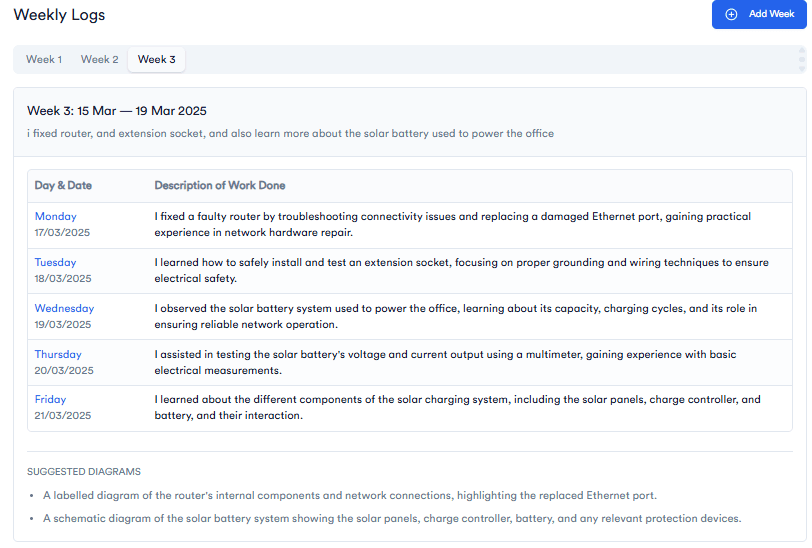
Conclusion
The history of SIWES in Nigeria is a testament to the country’s recognition of the importance of practical training in higher education. Since 1973, SIWES has continued to evolve, strengthening the relationship between the classroom and the industry.
As technology and industries advance, SIWES remains crucial in preparing students to meet the challenges of modern workplaces, empowering them to become competent, innovative, and employable graduates.
FAQs
What is the full meaning of SIWES?
The full meaning of SIWES is the Students Industrial Work Experience Scheme.
It is a program designed by the Industrial Training Fund (ITF) to give Nigerian students practical experience in industries related to their field of study.
When was SIWES established in Nigeria?
SIWES was established in 1973 by the Industrial Training Fund (ITF).
It officially began in 1974 after receiving Federal Government approval as a national initiative to bridge the gap between theory and practice in tertiary education.
Who introduced SIWES in Nigeria?
SIWES was introduced by the Industrial Training Fund (ITF).
The ITF created the scheme after employers complained that Nigerian graduates lacked practical skills needed to function effectively in the workplace.
What are the main objectives of SIWES?
The main objectives of SIWES are to expose students to real-life work experience and improve employability.
It helps students apply classroom knowledge, acquire technical skills, understand workplace ethics, and transition smoothly into the labor market.
Which students are eligible to participate in SIWES?
SIWES is for students in universities, polytechnics, and colleges of education in Nigeria.
It covers disciplines such as Engineering, Science, Technology, Agriculture, Environmental Studies, and Education.
What is the duration of SIWES?
The duration of SIWES depends on the type of institution.
- Universities: 3–6 months
- Polytechnics: 4 months (usually after ND I)
- Colleges of Education: 4 months (after Year 2)
Why is SIWES important to Nigerian students?
SIWES is important because it prepares students for the world of work.
It builds confidence, enhances problem-solving skills, and gives students exposure to the technologies and methods used in real industries.
Who funds the SIWES program?
The Federal Government of Nigeria funds SIWES through the Industrial Training Fund (ITF).
The ITF manages, supervises, and coordinates the program nationwide with other bodies like the NUC, NBTE, and NCCE.
When did Colleges of Education start participating in SIWES?
Colleges of Education joined SIWES in 1992.
This inclusion expanded the program’s reach to cover students in technical, science, and business education.
How can I write the overview and history of SIWES in my report?
Include the background, objectives, and timeline of SIWES in your Chapter One.
You can summarize the purpose of the scheme, when and why it was established, and its relevance to students. You may cite this source as:
MonoEd. (2025, October 4). The History of SIWES in Nigeria: Everything You Need to Know. https://monoed.africa/blog/history-of-siwes-in-nigeria
